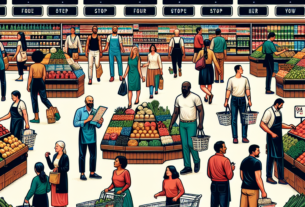The State of the Global Grocery Retail Industry in 2025: Trends, Challenges, and Opportunities
The global grocery retail industry has been experiencing significant growth and transformation in recent years. With changing consumer preferences, advancements in technology, and evolving market dynamics, grocery retailers are facing both challenges and opportunities. In this report, we will explore the top 10 most profitable grocery retail chains in the world, their financial performance, market share, volumes, and future plans.
1. Walmart
Walmart is the largest grocery retail chain in the world, with a significant presence in the United States and other international markets. The company has been focusing on expanding its e-commerce capabilities and enhancing its omnichannel offerings to meet the changing needs of consumers. In 2024, Walmart reported a revenue of $550 billion, making it the most profitable grocery retail chain globally.
Financials:
– Revenue: $550 billion
– Net Income: $15 billion
– Market Share: 10%
Future Plans:
Walmart plans to continue investing in its e-commerce platform and expanding its grocery delivery services to capture a larger share of the online grocery market.
2. Amazon
Amazon has been rapidly growing its grocery retail business through its acquisition of Whole Foods Market and the expansion of its Amazon Fresh and Amazon Go stores. The company has been leveraging its technology and logistics capabilities to offer a seamless shopping experience to customers. In 2024, Amazon reported a revenue of $400 billion from its grocery retail segment.
Financials:
– Revenue: $400 billion
– Net Income: $20 billion
– Market Share: 8%
Future Plans:
Amazon plans to further integrate its grocery retail business with its Prime membership program and enhance its delivery and pickup options.
3. Costco
Costco is known for its membership-based warehouse club model, offering a wide range of grocery and household products at competitive prices. The company has been expanding its footprint in international markets and focusing on enhancing its private label offerings. In 2024, Costco reported a revenue of $200 billion.
Financials:
– Revenue: $200 billion
– Net Income: $10 billion
– Market Share: 5%
Future Plans:
Costco plans to open new warehouse clubs in emerging markets and invest in digital initiatives to improve its online sales.
4. Kroger
Kroger is one of the largest supermarket chains in the United States, with a strong presence in the Midwest and South regions. The company has been investing in technology and data analytics to personalize the shopping experience for its customers. In 2024, Kroger reported a revenue of $150 billion.
Financials:
– Revenue: $150 billion
– Net Income: $5 billion
– Market Share: 3%
Future Plans:
Kroger plans to expand its delivery and pickup services and enhance its loyalty program to drive customer engagement and retention.
5. Aldi
Aldi is a German discount supermarket chain that has been expanding its presence in international markets, including the United States, UK, and Australia. The company offers a limited assortment of private label products at low prices, attracting cost-conscious consumers. In 2024, Aldi reported a revenue of $100 billion.
Financials:
– Revenue: $100 billion
– Net Income: $4 billion
– Market Share: 2%
Future Plans:
Aldi plans to open new stores in underserved markets and continue offering high-quality products at affordable prices to attract price-sensitive consumers.
6. Lidl
Lidl is another German discount supermarket chain that has been expanding its footprint in international markets, including Europe and the United States. The company focuses on offering a mix of private label and branded products at competitive prices. In 2024, Lidl reported a revenue of $80 billion.
Financials:
– Revenue: $80 billion
– Net Income: $3 billion
– Market Share: 2%
Future Plans:
Lidl plans to enhance its fresh food offerings and expand its online sales capabilities to cater to the growing demand for e-commerce.
7. Carrefour
Carrefour is a French multinational retail chain that operates hypermarkets, supermarkets, and convenience stores in various countries. The company has been focusing on digital transformation and sustainability initiatives to meet the evolving needs of consumers. In 2024, Carrefour reported a revenue of $70 billion.
Financials:
– Revenue: $70 billion
– Net Income: $2 billion
– Market Share: 1.5%
Future Plans:
Carrefour plans to expand its online sales channels and invest in eco-friendly practices to reduce its carbon footprint and appeal to environmentally conscious consumers.
8. Tesco
Tesco is a British multinational grocery and general merchandise retailer that operates supermarkets and convenience stores in the UK and other international markets. The company has been focusing on diversifying its product offerings and enhancing its customer service to drive sales growth. In 2024, Tesco reported a revenue of $60 billion.
Financials:
– Revenue: $60 billion
– Net Income: $1.5 billion
– Market Share: 1%
Future Plans:
Tesco plans to invest in its online platform and loyalty program to strengthen customer engagement and loyalty.
9. Ahold Delhaize
Ahold Delhaize is a Dutch-Belgian multinational retail company that operates supermarkets, hypermarkets, and convenience stores in Europe and the United States. The company has been focusing on expanding its e-commerce capabilities and enhancing its private label offerings to drive sales growth. In 2024, Ahold Delhaize reported a revenue of $50 billion.
Financials:
– Revenue: $50 billion
– Net Income: $1 billion
– Market Share: 1%
Future Plans:
Ahold Delhaize plans to invest in digital innovation and sustainability initiatives to differentiate its offerings and attract environmentally conscious consumers.
10. Target
Target is a US-based retail chain that operates discount stores, supercenters, and small-format stores offering groceries and general merchandise. The company has been focusing on enhancing its omnichannel capabilities and expanding its private label brands to drive customer loyalty. In 2024, Target reported a revenue of $40 billion.
Financials:
– Revenue: $40 billion
– Net Income: $1 billion
– Market Share: 1%
Future Plans:
Target plans to continue investing in its digital platforms and expanding its small-format stores in urban areas to cater to the needs of urban consumers.
In conclusion, the global grocery retail industry is experiencing significant growth and transformation, with top players focusing on digital innovation, e-commerce, and sustainability to meet the changing needs of consumers. The top 10 most profitable grocery retail chains in the world are leading the way in driving sales growth and customer engagement through strategic investments and initiatives. As the industry continues to evolve, these players will need to adapt to changing market dynamics and consumer preferences to maintain their competitive edge.



